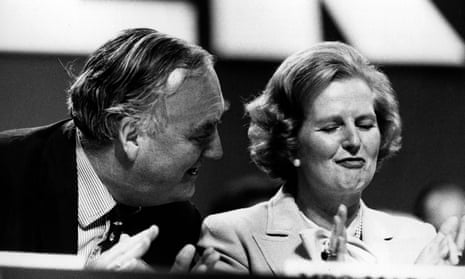In a delicately weighted coda at the end of Middlemarch, George Eliot quietly celebrates the unheroic but life-enhancing example of the novel’s central character. Dorothea Brooke’s spirit may have “spent itself in channels which have no great name on the earth,” Eliot writes. “But the effect of her being on those around her was incalculably diffusive, for the growing good of the world is partly dependent on unhistoric acts.”
The effect of the Home Office civil servant David Faulkner, who died last week aged 86, was incalculably diffusive too. I didn’t know him terribly well, but I am definitely one of many journalists, researchers, academics and practitioners whom he influenced. In manner, Faulkner was always modest, fair, serious and unflashy. When I have mentioned him to others in the last few days, the first thing that people say is always – and rightly – how nice he was.
But Faulkner was also a tough thinker. He honed his policymaking talents in the 1980s, a turbulent time for British government. As a result, he always looked round political corners before charging on. He liked to say his job was to speak truth to power, but in a voice to which power would listen. In this way, unlike Dorothea Brooke, he managed to notch up some notably historic acts too. These included the setting up of the still invaluable independent prisons inspectorate. He also oversaw a long period in the 1980s in which government policy towards criminal justice, penal issues, policing and drugs took serious account of research and facts rather than following and chasing headlines. This may seem surprising, since these were the Margaret Thatcher years, but on these issues the Home Office was able to keep its distance from No 10.
Faulkner was a liberal in the best sense. In one of the books he wrote in retirement he defined this in an exemplary way – and with a neat thrust of the dagger at the end:
“The term ‘liberal’ has come to be used as one of abuse, often without much thought for what it means. I have always understood it to mean a commitment to the values of freedom, democracy, social justice, respect for the individual and protection from oppression by corporate interests or the state. Critics now associate it with weakness, complacency and social irresponsibility and by doing so diminish the fundamental values for which it stands. Politicians and others praise the liberal values for which the country fought two world wars, but rarely apply them to contemporary situations.”
He also embodied a form of civil service integrity that now seems increasingly remote. In Faulkner’s civil service generation, career paths took very different directions from today. He spent almost his whole career in one department, the Home Office, moving up through it and developing a commitment to the institution itself. Today that institutional mentality would be a cause for censure, not approval, and the lack of diversity that went with it would trigger justified alarm. But it gave room for senior civil servants to be involved in policy development in ways that are also rarer today, when so much of a department’s work is routinely outsourced (which was not yet the case in the Home Office in the 1980s) to consultancies and cronies as well as to more partisan pressure groups.
The upshot was that Faulkner’s thoughtfulness, preparedness and openness were mostly treated as a departmental asset, not a threat. It is hard to think of any career civil servant who was so genuinely interested for so long in solving hard public policy problems calmly, in listening to what others knew and thought before making a decision, or who was so willing to share his own thinking with colleagues and with others as he did so. He was the antithesis of the Yes Minister stereotype.
Probably Faulkner’s finest hour was when he was the head of what was then the Home Office prison department, before taking charge of criminal justice policy more generally until 1992. Faulkner didn’t achieve everything he wanted in either of these roles, not by a long chalk, and his heart wasn’t always in everything that he had to do. But he had an ethos and a strategy, and he was a pivotal figure in something that mattered a lot, helping to create a more liberal, rational and purposeful criminal justice world than had existed before that period of reform. It was the golden age of the much missed Home Office research unit.
But that was then, and this is now. References to the growing good of the world, as George Eliot put it, ring hollow in these post-liberal times. The fairness, transparency, fact-based policymaking and the openness to ameliorative ideas that marked Faulkner’s approach are despised in the Dominic Cummings era. Public confidence, expressed through mainstream media, and later social media, has been the great governmental god of the past quarter century, from New Labour to Boris Johnson.
Towards the end of his autobiographical 2014 Servant of the Crown, Faulkner reflected on whether his liberal principles were now an anachronism. “I have asked myself many times whether they belong to an era which has now passed,” he wrote. “But I cannot persuade myself that they are no longer relevant. To argue for them is not to try to return to the past, but to find a sense of direction for the future.”
Is this merely denial? Or is it possible that a new liberal approach to collective ethos and rational policymaking can in fact be forged again from the fractured pieces of the liberal past? Looking at Donald Trump’s defiance of America’s voters, at the insouciance with which Boris Johnson dismisses a possible EU trade deal, or the shamelessness of the current UK government’s partisan chumocracy, it is hard to be confident. Yet Faulkner’s instinct was right. The plain fact is that, for all the difficulties, there is no alternative.

